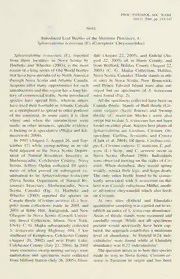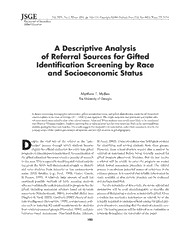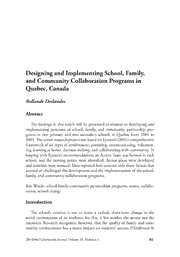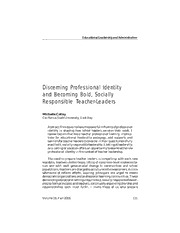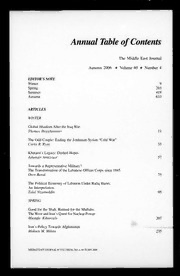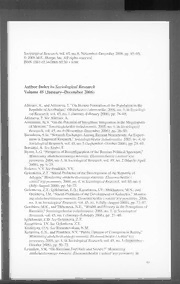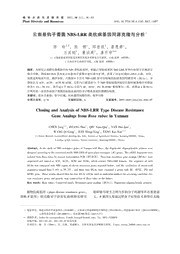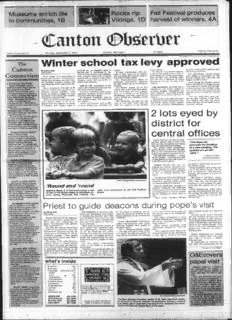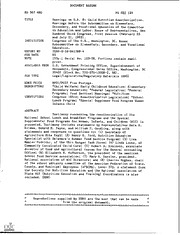
ERIC ED367480: Hearings on H.R. 8: Child Nutrition Reauthorization. Hearings before the Subcommittee on Elementary, Secondary, and Vocational Education of the Committee on Education and Labor. House of Representatives, One Hundred Third Congress, First Se PDF
Preview ERIC ED367480: Hearings on H.R. 8: Child Nutrition Reauthorization. Hearings before the Subcommittee on Elementary, Secondary, and Vocational Education of the Committee on Education and Labor. House of Representatives, One Hundred Third Congress, First Se
DOCUMENT RESUME ED 367 480 PS 022 124 TITLE Hearings on H.R. 8: Child Nutrition Reauthorization. Hearings before the Subcommittee on Elementary, Secondary, and Vocational Education of the Committee on Education and Labor. House of Representatives, One Hundred Third Congress, First Session (February 23 and July 21, 1993). INSTITUTION Congress of the U.S., Washington, DC. House Subcommittee on Elementary, Secondary, and Vocational Education. REPORT NO ISBN-0-16-041769-4 PUB DATE 93 NOTE 153p.; Serial No. 103-28. Portions contain small print. AVAILABLE FROM U.S. Government Printing Office, Superintendent of Documents, Congressional Sales Office, Washington, DC 20402 (Stock No. 552-070-15508-2, $6). PUB TYPE Legal/Legislative/Regulatory Materials (090) EDRS PRICE MF01/PC07 Plus Postage. DESCRIPTORS *Child Welfare; Early Childhood Education; Elementary Secondary Education; *Federal Legislation; *Federal Programs; Food Service; Hearings; *Nutrition IDENTIFIERS Congress 103rd; Reauthorization Legislation; *School Lunch Program; *Special Supplemen Food Program Women Infants Child ABSTRACT Testimony concerning the reauthorization of the National School Lunch and Breakfast Programs and the Special Supplemental Food Programs for Women, Infants, and Children (WIC) is presented. Testimony includes statements by Representatives Dale E. Kildee, Donald M. Payne, and William F. Goodling, along with statements and responses to questions by: (1) Secretary of Agriculture Mike Espy; (2) Nancy H. Ford, Nutrition Education Specialist with Delaware's Summer Food Service Program; (3) Lisa Hamler-Podolski, of the Ohio Hunger Task Force; (4) Linda Locke, of Community Coordinated Child Care; (5) Robert A. Robinson, associate director of food and agricultural issues for the' General Accounting Office; (6) Elizabeth M. McPherson, the president of the American School Food Service association; (7) Mary K. Kassler, president, National Association of WIC Directors; and (8) Charles Hughes, chair of the school advisory committee of the American Federation of State, County, and Municipal Employees (AFSCME), Local 372. A statement from the Society for Nutrition Education and the National Association of State NET (Nutrition Education and Training) Coordinators is also included. 011:11.0 *********************************************************************** Reproductions supplied by EDRS are the best that can be made from the original document. *********************************************************************** HEARINGS ON H.R. 8: CHILD NUTRITION REAUTHORIZATION U.S. DEPARTMENT OF EDUCATION OtIrce ol Educational Research and Improvement EDUCATIONAL RESOURCES INFORMATION CENTER (ERIC) XThrs document has teen reprOduced aS Ieceived from the persOn or orpan.zetion oriornatogo O Mtnor changes have been made tO improve reproducton oualdy HEARINGS Points ol view or opinions stated in this doco merit do not necessanty represent otliciaI OEFII position or poticy BEFORE THE SUBCOMMITTEE ON ELEMENTARY, SECONDARY, AND VOCATIONAL EDUCATION OF TILE COMMITTEE ON EDUCATION AND LABOR HOUSE OF REPRESENTATIVES ONE HUNDRED THIRD CONGRESS FIRST SESSION HEARINGS HELD IN WASHINGTON, DC, FEBRUARY 23 AND JULY 21, 1993 Serial No. 103-28 Printed for the use of the Committee on Education and Labor U.S. GOVERNMENT PRINTING OFFICE 3-410 WASHINGTON : 1993 GQ2 ing ()like b!, the t .S. Giivenunent hnti For Superintendent ot l)munwnts, Congie,iunal Sale. admigumn. IX 20402 C*111 ISBN 0-16-041769-4 Poi 2 COMMITTEE ON EDUCATION AND LABOR FORD, Michigan, Chairman WILLIAM D. WILLIAM (BILL) CLAY, Missouri WILLIAM F. GOODLING, Pennsylvania GEORGE MILLER, California THOMAS E. PETRI, Wisconsin AUSTIN J. MURPHY, Pennsylvania MARGE ROUKEMA, New Jersey DALE E. KILDEE, Michigan STEVE GUNDERSON, Wisconsin PAT WILLIAMS, Montana RICHARD K. ARMEY, Texas MATTHEW G. MARTINEZ, California HARRIS W. FAWELL, Illinois MAJOR R. OWENS, New York PAUL B. HENRY, Michigan THOMAS C. SAWYER, Ohio CASS BALLENGER, North Carolina DONALD M. PAYNE, New Jersey SUSAN MOLINARI, New York JOLENE UNSOELD, Washington BILL BARRETT, Nebraska PATSY T. MINK, Hawaii JOHN A. BOEHNER, Ohio ROBERT E. ANDREWS, New Jersey RANDY "DUKE" CUNNINGHAM, California JACK REED, Rhode Island PETER HOEKSTRA, Michigan TIM ROEMER, Indiana HOWARD P. "BUCK" McKEON, California ELIOT L. ENGEL, New York DAN MILLER, Florida XAVIER BECERRA, California ROBERT C. SCOTT, Virginia GENE GREEN, Texas LYNN C. WOOLSEY, California CARLOS A. ROMERO-BARCELO. Puerto Rico RON KLINK, Pennsylvania KARAN ENGLISH, Arizona TED STRICKLAND, Ohio RON DE LUGO, Virgin Islands ENI F. H. FALEOMAVAEGA, American Samoa SCOTTY BAESLER, Kentucky ROBERT A. UNDERWOOD, Guam F. RISSLER, Staff Director PATRICIA Minority Staff Director JAY EAGEN, SUBCOMMITTEE ON ELEMENTARY, SECONDARY, AND VOCATIONAL EDUCATION DALE E. KILDEE, Michigsm, Chairman GEORGE MILLER, California WILLIAM F. GOODLING, Pennsylvania THOMAS C. SAWYER, Ohio STEVE GUNDERSON, Wisconsin MAJOR R. OWENS, New York HOWARD "BUCK" McKEON, California JOLENE UNSOELD, Washington THOMAS E. PETRI, Wisconsin JACK REED, Rhode Island SUSAN MOLINARI, New York TIM ROEMER, Indiana RANDY "DUKE" CUNNINGHAM, California PATSY T. MINK, Hawaii DAN MILLER, Florida ELIOT L. ENGEL, New York MARGE ROUKEMA, New Jersey XAVIER BECERRA, California JOHN A. BOEHNER, Ohio GENE GREEN, Texas LYNN C. WOOLSEY, California KARAN ENGLISH, Arizona TED STRICKLAND, Ohio DONALD M. PAYNE, New Jersey CARLOS A. ROMERO-BARCELO, Puerto Rica 3 CONTENTS Page Hearings: Washington, DC, February 23, 1993 1 Washington, DC, July 21, 1993 73 Statement of: Espy, Hon. Mike, Secretary of United States Department of Agriculture, Washington, DC; accompanied by George Braley, Acting Administrator, United States Department of Agriculture, Washington, DC 4 Ford, Nancy H., Specialist, Nutrition Education, Summer Food Service Program, Delaware Department of Public Instruction; Lisa Hamler- Podolski, Coordinator, Community Food and Nutrition Programs, Ohio Hunger Task Force; Linda Locke, Assistant Director, Community Co- ordinated Child Care; and Robert A. Robinson, Associate Director, Food and Agricultural Issues, Resources, Community and Economic Develop- ment Division, General Accounting Office, accompanied by Jim Fowler and Dale Wolden 76 McPherson, Elizabeth M., President, American School Food Service Asso- ciation, Alexandria, VA; Mary K. Kessler, President, National Associa- tion of WIC Directors, Washington, DC; Charles Hughes, President, AFSCME, Local 372, District Council 37, New York, NY 34 Prepared statements, letters, supplemental materials, et cetera: Espy, Hon. Mike, Secretary of United States Department of Agriculture, Washir.gton, DC, prepared statement of 10 Ford, Nancy H., Specialist, Nutrition Education, Summer Food Service Program, Delaware Department of Public Instruction, prepared state- ment of 80 Goodling, Hon. William F., a Representative in Congress from the State of Pennsylvania, prepared statement of 74 Hamler-Podolski, Lisa, Coordinator, Community Food and Nutrition Pro- grams, Ohio Hunger Task Force, prepared statement of 89 Hughes, Charles. President, AFSCME, Local 372, District Council 37, New York, NY, prepared statement of 69 Kessler, Mary K., President, National Association of WIC Directors, Washington, DC, prepared statement of 53 Locke, Linda, Assistant Director, Community Coordinated Child Care, prepared statement of 105 McPherson, Elizabeth M., President, American School Food Service Asso- ciation, Alexandria, VA, prepared statement of 38 Payne, Hon. Donald M., a Representative in Congress from the State of New Jersey, prepared statements of February 23, 1993 4 July 21, 1993 75 Robinson, Robert A., Associate Director, Food and Agricultural Issues, Resources, Community and Economic Development Division, General Accounting Office, prepared statement of 131 Society for Nutrition Education and The National Association of State N.E.T. Coordinators, prepared statement of 67 WTI 4 OVERSIGHT HEARING ON H.R. 8: CHILD NUTRITION PROGRAMS TUESDAY, FEBRUARY 23, 1993 HOUSE OF REPRESENTATIVES SUBCOMMITITE ON ELEMENTARY, SECONDARY, AND VOCATIONAL EDUCATION COMMITTEE ON EDUCATION AND LABOR Washington, DC. The subcommittee met, pursuant to notice, at 10 a.m., Room 2175, Rayburn House Office Building, Honorable Dale E. Kildee, Chairman, presiding. Members present: Representatives Kildee, Miller of California, Sawyer, Unsoeld, Reed, Roemer, Becerra, Green, Woolsey, English, Strickland, Romero-Barcelo, Ford, Good ling, Gunderson, McKeon, and Molinari. Staff present: Susan Wilhelm, staff director; Dennis Fargas, budget analyst/professional staff member; Margaret Kajeckas, leg- islative associate; June Harri s, legislative specialist; Lynn Selmser, professional staff member; and Jack Jennings, educational counsel. Chairman KILDEE. The schoolteacher, not the politician, compels me to start on time. I want to welcome all the people here today for this hearing, especially those with the American School Food Services Association. You have been administrators, you have been just so helpful to this committee throughout the years, and we try to coincide our hearings with the opportunity that you have to be here in the city. I will make some brief introductory remarks and then defer to Mr. Goodling, my good friend. Then the Secretary should be here momentarily, and he will be our first witness then. The Subcommittee on Elementary, Secondary, and Vocational Education convenes this morning for an oversight hearing on sev- eral child nutrition programs under this subcommittee's jurisdic- tion. The subcommittee is in the midst of reauthorizing the Ele- mentary and Secondary Education Act this session. Well, while we do that, it's appropriate to take some time to focus on the child nu- trition programs, because good nutrition is vital to academic suc- cess. Studies have shown that undernourished children are less phys- ically active, less attentive, and less independent and curious. They are more anxious and cannot concentrate as well. As a result, their reading ability, their verbal skills, their motor skills suffer. It's ob- vious that if we are interested in school reform, we also have to make sure that our children are fed. (1) 5 2 I taught school, as many of you know, for 10 years and personal- ly observed in those 10 years the need for good nutrition. I always tell this story, and I'll abbreviate it a bit here, that before the school breakfast program was ever st Irted at the Federal level, I started the school breakfast program at Flint Central High School in Flint, Michigan, for one student. You've heard me tell this story probably many times, Bill. He has heard all my stories through the years. But in my home room, every day someone's lunch was being stolen. I was raised in a family where stealing was a very, very se- rious sin and crime. I was determined to catch the culprit and laid a trap and finally caught the culprit. I was going to turn him in, of course, to the principal where he would have been suspended from school. When I caught him, I found outwithout going into detailthat in the morning his mother was in no condition to ever prepare him a breakfast. When he got to school in the morning, his first job was to try to find something to eat. He told me, he said, "Mr. Kildee, I never steal the same lunch from the same person in the same week." [Laughter.] Chairman KILDEE. I thought, well, that kid has ethics. That's good, you know. Rather than turning him in to the principal, I took him down to the cafeteria and spoke to Mrs. Pelky, who was in charge of the cafeteria, and I said, "Now, this young gentleman, Robert, will be coming down here every morning, and prepare something for him for breakfast and send me the bill." Well, for the next 3 years Robert got a breakfast, and I never got a bill. That was a one-person school breakfast program there at Flint Central High School. This subcommittee has jurisdiction over the National School Lunch and Breakfast Programs, the Special Supplemental Food Programs for Women, Infants, and Children, "WIC." I was very happy to see the President's announcement on WIC during his State of the Union message. We have jurisdiction over Summer Food, the Child and Aduh Care Food Program, and several other programs that help fight childhood hunger. Several of these programs expire in 1994, so that reauthorization next year will give us a chance to review all of the child nutrition programs with an eye towards serving more children more effec- tively. On the first day of this session, Mr. Goodling, Mr. Ford, and myself introduced H.R. 8, to reauthorize the expiring programs. This morning we will focus on the National School Lunch and Breakfast Programs and WIC. As we stated, we are all pleased with President Clinton's statement on WIC the other night. WIC is one of the most cost-effective Federal programs in existence, be- cause it prevents the ill effects of developmental malnutrition from ever occurring. It prevents the loss of intellectual and physical ca- pacity and even the loss of life. We are quite pleased this morning to have Secretary Espy here, my former seatmate on the Budget Committee where he knew the budget process far better than I and shared his wisdom with me. 6 3 He is here t7., is morning to discuss this proposal and some of the administration's other ideas concerning these critical programs. This is the first time in recent history that a Secretary of Agri- culture has appeared before the Education and Labor Committee. I think Jack, or John Block, appeared in 1981. I think he was here. And his deputy, Richard Ling, would testify from time to time. We appreciate, Secretary Espy, your being with us here today. Before I introduce our witness, I would like to call my very good friend and my colleague and one who has been a consistent and solid supporter of nutrition programs, Mr. Goodling, the ranking Republican member of the full committee and the ranking Republi- can member of this subcommittee, to make a statement. Mr. Goodling? Mr. GOODLING. Thank you, Mr. Chairman. I don't know whether I have any stories to top this story or not. The ones I would tell, you would have heard also, I would imagine, before. The one I like to tell most of all is my first encounter with a Senate in conference on school lunch and child nutrition. At that time I had just come from being a school superintendent and was always upset that so much food was thrown away because we had to give them everything that was there whether they wanted it or whether they didn't. I thought, well, I will be brave enough and see whether I can't do something about that. When we got to conference, the great Senator from Minnesota was there, but so were some others whose staff were telling them, "No, no, you can't change that. Everybody has to take everything that is served. If you don't, it will destroy their diet," et cetera, et cetera. I don't know how it destroyed their diet; they weren't eating it anyway. But at any rate, I took a chance and I finally said, "That's stupid, in my estimation. If a youngster isn't going to eat red beets, why in the world are we putting them on their tray so they can dump them back in the trash?" The good Senator Humphrey said, "I agree with that. Muriel in- sists I eat red beets. I hate red beets, and I'm not going to eat red beets, and kids shouldn't have to eat red beets." [Laughter.] Mr. GOODLING. It paSsed. Chairman KILDEE. He picked the right one. Mr. GOODLING. If I had said asparagus or spinach or something else, it probably wouldn't have worked, but somehov, or other the Good Lord said, "Say red beets," and that's what I said. Well, it's your twenty-first time here. I'm not quite here that long, but close, almost every time as I sat at the knees of our great Chairman Perkins and learned all about school lunch and child nu- trition, followed by Chairman Hawkins, followed by Chairman Ford, and now working with the subcommittee Chairman, probably one of the finest members of Congress that we have. We belong to each other's mutual admiration society, so I thought I would throw that in. I want to welcome all of you here. I particularly want to welcome the Secretary of Agriculture. Being a congressman is almost impos- sible. I would think trying to run a department as large as the Ag- riculture Department is an impossible task, but I know you will be 7 4 up to it. We will do wnat we can to help you rather than hinder you. I look forward to your testimony this morning. Thank you, Mr. Chairman. Chairman KILDEE. Thank you. STATEMENT OF HON. DONALD M. PAYNE, A REPRESENTATIVE IN CONGRESS FROM THE STATE OF NEW JERSEY Mr. Chaii man, let me commend you for calling this oversight hearing on child nutrition programs. As we know, programs like the Supplemental Food Program for Women, Infants and Children [WIC], the School Lunch Program and related programs work. They improve the health and the nutritional status of the participants and they also save Federal medicaid costs. Mr. Chairman we need to continue the trend of political and financial support for these programs that do work and strive to provide these services to all citizens that are eligible. I am so pleased that this administration has shown such great interest in helping the children and families of this Nation. I would like to welcome all of the witnesses, and I especially welcome my former colleague and fellow Congressional Black Caucus member the Secretary of Agricul- ture, Mike Espy. I look forward to hearing your testimony. Chairman KILDEE. I think we will go to the Secretary right now. So Mr. Secretary if you would step forward. I can't tell you enough how proud the House is to have one of its own members serving as Secretary of Agriculture. You certainly were an outstanding member of the House, and I know you will be an outstanding Sec- retary of Agriculture. We welcome you here this morning. You may proceed in any fashion you wish, Mr. Secretary. STATEMENT OF THE HONORABLE MIKE ESPY, SECRETAL:i OF UNITED STATES DEPARTMENT OF AGRICULTURE, WASHING- TON, DC, ACCOMPANIED BY GEORGE BRALEY, ACTING ADMIN- ISTRATGR, UNITED STATES DEPARTMENT OF AGRICULTURE, WASHINGTON, DC Mr. ESPY. Mr. Chairman, thank you for the opportunity of being here today. To Mr. Good ling, my friend, I also appreciate your being here. The Chairman said that I sat next to him on the Budget Commit- tee for about 6 years, and I got a chance to know him through that experience. I have to admit, though, Mr. Chairman, I am awfully glad that I am off that committee. It's a tough, tough assignment. Here I come, it's my first appearance before this subcommittee, and Bill Good ling says that I have an impossible job and then he talks about red meat to someone who has been dealing with red meat over the last 31/2 weeks. I am honored to be here today, Mr. Chairman. I am here for a reason. The Agriculture Department is very large, as you know. We have about a $62 billion budget. If you would compare the asset value of our portfolio, it would compare favorably to Citibank and Bank of America. It is incredibly large. As you know, we have many things that we do over thereinter- national aid, international trade, farm programs, forestrybut principal among our jobs is our intent to maintain programs that keep children healthy and provide a nutritional diet. School lunch, school breakfast, and of course the WIC program are all vital, so vital to what we do every day. I do have a statement. I will try not to impose upon your time by reading it all. If you would, Mr. 5 Chairman, I would just like unanimous consent to enter the entire statement into the record. Chairman KILDEE. Without objection, it shall be entered. Mr. ESPY. As I said, Mr. Chairman, I'm honored to be responsible for the programs which provide food and nutrition education to millions of children and adults in our Nation daily. Programs such as the National School Lunch Program, the School Breakfast Pro- gram, and the WIC Program are all so very vital. President Clinton in h. ; Inaugural Add-ess stated that there is nothing wrong with America that can't be cured by what is right with America. One part of what is right with our country is the dedication and vigor of people involved in providing nutrition to America's children; persons daily attacking the problems of hunger in this country. A hungry child can't learn. Each day in every school lunchroom in the United States, we change a life for the better and we invest in our Nation's future. Each person who has a hand in feeding children a nutritious meal should be commended, and there are many here today. At this point also, Mr. Chairman, let me commend you for your leadership in feeding our children and making certain that hungry children get a chance to learn without having to worry if they will have a breakfast or an adequate lunch. I would also like to commend Mr. Good ling for his long and un- tiring commitment to the Special Nutrition Programs. He and this entire committee have always treated these issues in a bipartisan fashion, and I will work with all of you in that same spirit. You have my pledge on that one. In testifying today, at the outset, I would like to say that the ad- ministration is currently formulating the President's fiscal year 1994 Budget. OMB would like me to remind you that therefore I am not in the position to provide you with the administration's pa sitions on funding fcm specific programs or activities, but I've had a peek at it. Chairman KILDEE. In the past administrations, I always encour- aged the Secretary to ignore OMB, but I won't make that state- ment this time. Mr. ESPY. I can hardly do that. I made a speech last night, Mr. Chairman, where I said that I now know the difference between a Member of Congress and a Cabinet Member: a Member of Congress can pretty much say what he or she wants to say, and a Cabinet Member has always this ominous OMB. I might be the first Cabi- net Secretary to protest for First Amendment freedoms for Cabinet secretaries. However, although I'm not in the position to be very specific about the fiscal year 1994 Budget, I can say that I've seen a peek at it with regard to our request for nutrition programs. I would believe, I could say in all honesty, that this is the first time in 12 years that we are going to be coming before you asking for an increase in programs for food and nutrition. [Applause.] Mr. ESPY. Mr. Chairman, recent statistics about the need for Fed- eral food programs couldn't be more clear. In 1991, 35.7 million Americans lived in poverty. Unfortunately, a disproportionate number of the poor are children. One out of every five American children, 21.8 percent lived in poverty; a rate higher than any 9 6 other age group, including the elderly. Happily, one program that's working well to address the nutritional needs of children is the Na- tional School Lunch Program. As committed as this government is, we still need to do more. In the National School Lunch Program, more than 92,000 schools and residential institutions participate. About half of the children get free or reduced price meals. The program is available to 98 percent of public schoolchildren and about 90 percent of all schoolchildren. The appropriation for the National School Lunch Program in fiscal year 1993 was about $4 billion, up from $3.6 billion in fiscal year 1992. It is also important to note that the assistance provided by the National School Lunch Program is also available to those who have been adversely affected by this weak economy. Unfortunately, that number has been growing, and I'm proud that our lunch program is there and that we're in a position to help. The breakfast program participation is about 4.9 million per day. In my opinion, this is not enough. Some recent efforts have been made to encourage school breakfast expansion. Grants totalling $23 million will enable more than 6,000 schools to join the program, serving to that point almost a million children. There is still, how- ever, a wide gap between the number of breakfasts served and lunches served, with as many as 25 million lunches being served but only about 5 million breakfasts. The appropriation for fiscal year 1993 was $902 million, which was a big increase from the $722 million in fiscal year 1992. The Child and Adult Care Food Program provides cash and com- modity assistance to nonresidential child care and adult day care centers, and through sponsors, to family day care homes for chil- dren. Average daily participation for Child and Adult Care Centers in 1992 was about 1.7 million. The fiscal year 1993 appropriation for this program was $1.3 billion, up from $1.2 billion in fiscal year 1992. We also have, as you know, Mr. Chairman, the Summer Food Service Program, which provides nutritious meals to children when school is not in session. It has also experienced a significant expan- sion in the last several years. This growth has been driven by out- reach efforts encouraged by various organizations and changes in the law which reopened the program to private nonprofit sponsors. I support and I encourage these efforts toward outreach, and we will be doing more. For many students, school meals make a significant contribution 40? to their daily nutrient intake. An objective of the Healthy People 2000 initiative calls for increasing to at least 90 percent the propor- tion of school lunch, breakfast, and child care food services whose menus are consistent with the principles of the Dietary Guidelines for Americans. In addition to these goals, the planning of meals must take into consideration children's food preferences and the cost of meal pro- duction. The Department recognizes that meals need to be present- ed in ways that make children eager to eat the school meal. There must also be a continuing awareness of the special dietary needs of these children with special requirements. 1 0
The list of books you might like

The 5 Second Rule: Transform your Life, Work, and Confidence with Everyday Courage

Haunting Adeline

Believe Me

The Silent Patient
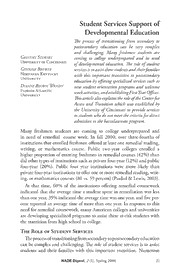
ERIC EJ1097751: Student Services Support of Developmental Education

GB 1796-1: Tyre valves -Part 1:Clamp-in valves
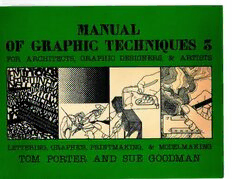
MANUAL OF GRAPHIC TECHNIQUES 3 (ic anon uploaded)

Travel and Adventure in South-East Africa:
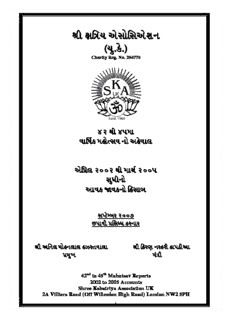
42-45 Mahotsav Reports
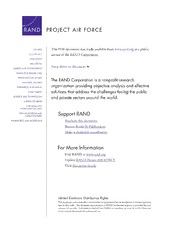
DTIC ADA458978: Valuing Programmed Depot Maintenance Speed: An Analysis of F-15 PDM
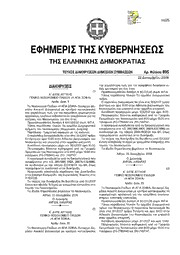
Greek Government Gazette: Part 7, 2006 no. 895

The Natural History of Chocolate by D de Quelus
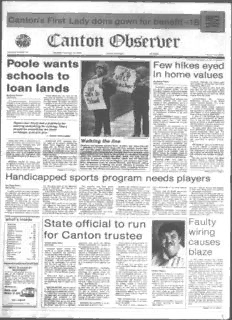
C anton €>fa^erner 1

Ark Performance Body Kits Installation Instructions

Greek Government Gazette: Part 7, 2006 no. 630
